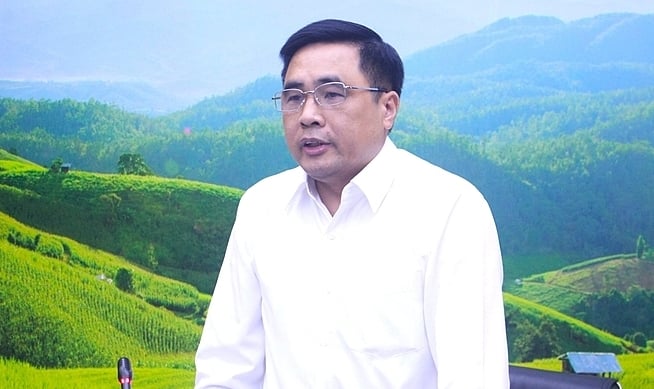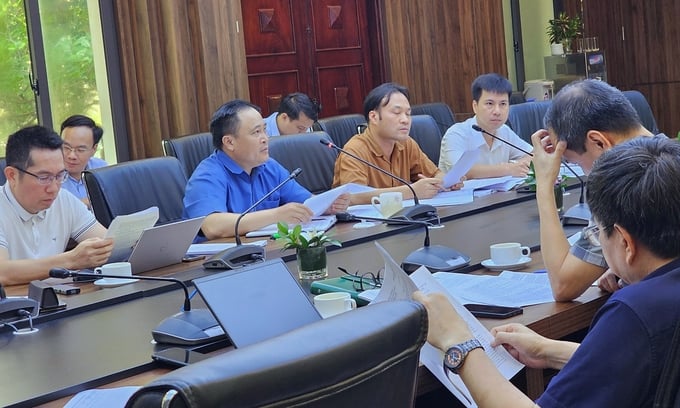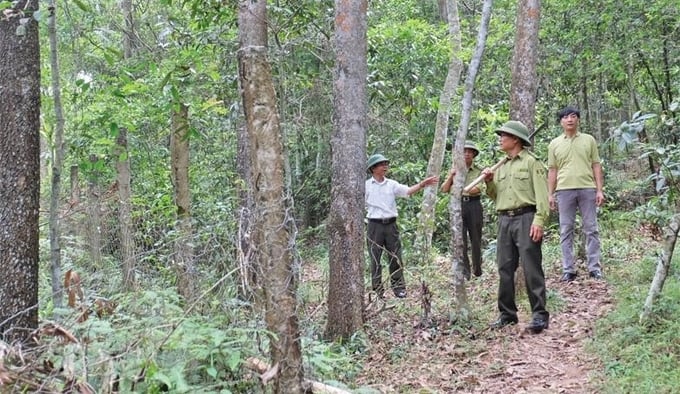June 18, 2025 | 16:56 GMT +7
June 18, 2025 | 16:56 GMT +7
Hotline: 0913.378.918
June 18, 2025 | 16:56 GMT +7
Hotline: 0913.378.918

Deputy Minister Nguyen Quoc Tri: Decentralizing management to localities has been a policy for many years.
During a meeting with the Ministry of Agriculture and Rural Development (MARD) on June 3, Luong Trong Quynh, the Vice Chairman of the People's Committee in Lang Son Province, mentioned that the Huu Nghi – Chi Lang Expressway, which started construction in late April 2024, is scheduled to have four lanes and a 17-meter roadbed in its initial phase. During the concluding stage, the project will be extended to encompass six lanes, resulting in a total width of 32 meters.
As a result of alterations in the transportation network design, the leadership of Lang Son has declared that over 200 hectares of forest must be transformed for this undertaking, which encompasses approximately 50 hectares of untouched forest. The local authorities need clarification due to the absence of the Land Law 2024, which came into effect on July 1, and the modified Decree 156 that guides executing the Law on Forestry.
Mr. Quynh sought additional clarification from MARD regarding ongoing transitional projects such as the Huu Nghi - Chi Lang Expressway, particularly regarding the distinction between the approval of investment policies and the approval of policies for converting forest land use.
The Huu Nghi - Chi Lang project aims to connect with the Bac Giang - Chi Lang Expressway (Lang Son) to create a direct route from Hanoi to the Huu Nghi border gate. The route is regarded as the crucial artery of Lang Son Province, enabling the transfer of products over the Vietnam-China border and enhancing socio-economic progress in the northeastern regions.
In line with the efforts of Lang Son, Deputy Minister Nguyen Quoc Tri stressed that the MARD proposes a comprehensive decentralization of forest land use conversion to local authorities in the updated Decree 156.
Regarding public investment projects that entail the transformation of forested land, if the provincial People's Council can determine the investment and land use conversion policies, there is no need for a formal process or procedures to decide on the forest land use conversion policy.
As part of the investment policy approval evaluation procedure, the inter-agency appraisal council will seek the opinion of the provincial Department of Agriculture and Rural Development regarding the forest land use conversion policy, in accordance with forestry law rules. Furthermore, the province People's Committee is accountable for making decisions about the conversion of forest land use and instructing project owners to meet their obligations of replacing forests following legislative requirements.

The delegation of Lang Son province, led by Vice Chairman Luong Trong Quynh, worked with the Ministry of Agriculture and Rural Development on the morning of June 3.
Projects that have been authorized by relevant authorities (such as the National Assembly, Prime Minister, or Provincial People's Council) before the modified Decree 156 coming into force will be allowed to proceed as planned.
"The consistent policy of decentralizing management to localities has been implemented for many years, not only in the forestry sector." MARD will oversee and examine the responsibilities that have been dispersed in the field of state management. "The Deputy Minister stated that the provincial People's Committee will serve as the central entity responsible for organizing the actual measurements,"
MARD's leadership admitted that several provinces across the country encounter comparable difficulties, including the one in Lang Son. Nevertheless, following the 2017 Forestry Law, any initiatives that include the conversion of forest areas must receive approval from appropriate authorities. Thus, the province People's Council has the authority to make a supplemental resolution to declare its endorsement of this policy officially.
Deputy Minister Nguyen Quoc Tri disclosed that the proposed revision to Decree 156 has undergone two stages of public consultation in Lang Son. MARD sent the most recent draft immediately to the Deputy Prime Minister on the afternoon of June 3. He anticipates and is convinced that the forthcoming decree will receive approval and be officially released in June 2024.
An important aspect of the draft is the clear allocation of responsibility to different ministries, sectors, local authorities, and forest owners regarding the trading and commercialization of emission reductions and carbon credits. The objective is to effectively oversee the sustainable management of forests, optimize resource utilization, and explore opportunities for generating revenue through forest-based environmental services.

According to Decision No. 379, the forest coverage rate of Lang Son in 2023 reached 64%, ranking among the top in the country.
Deputy Minister Nguyen Quoc Tri has stated that the new decree, which has been implemented at the same time as the Land Law 2024, would effectively resolve many challenges local authorities face regarding forest management, protection, and development.
In addition, he observed that forestry rules are increasingly being adjusted to reflect actual environmental conditions better. As an example, Decree 58, which was released on May 24, elevated the yearly level of the support and forest protection contract to 500,000 VND per hectare, representing a 100,000 VND increment from the existing rate. Furthermore, the funding allocation for special-use forest management boards has increased to 150,000 VND per hectare, representing a 50,000 VND rise.
During the time frame before the issuance of the new decree, the Deputy Minister recommended that local authorities incorporate the statement "Concur with the policy of converting forest land use" when approving investment policies related to projects that involve the conversion of forest land use. This strategy follows the revised Land Law and the 2017 Forestry Law, and it prevents the creation of extra administrative procedures
Translated by Linh Linh

(VAN) According to the Binh Thuan Department of Industry and Trade, in the first five months of 2025, Binh Thuan's dragon fruit export turnover increased by 20.65% compared to the same period last year.

(VAN) EU countries on Thursday gave final approval to new tariffs on fertilizer imports from Russia, a move aimed at cutting off revenue that could support Moscow’s war in Ukraine, despite concerns from European farmers.

(VAN) The working delegation from the Ministry of Agriculture and Environment conducted an important trip to the Netherlands to strengthen strategic partnerships and sustainable development in the agricultural sector.

(VAN) The letter ‘A Plea from the Ocean’ not only evokes emotion but also awakens the human conscience to the responsibility of protecting life on Earth.

(VAN) The Department of Agriculture in South Africa has announced the country’s first mass vaccination of poultry to prevent local birds from contracting avian influenza.

(VAN) Establishment of the Mekong Delta Regional Agricultural Linkage Center, aiming for a closed value chain, deep processing, trading platforms, and international market connectivity.

(VAN) Gia Lai province has recently recorded 460 rare species of animals and plants, contributing to forest conservation and biodiversity planning in the region.